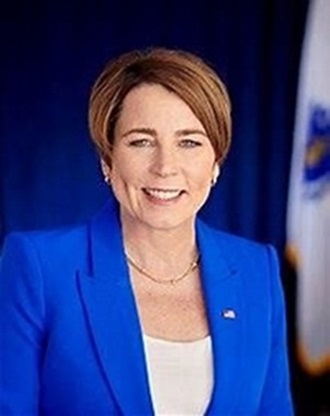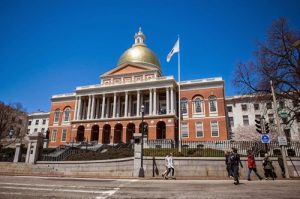Healey-Driscoll Administration Announces $10M for Regional Transit
Funding is going to Regional Transit Authorities to promote improved connections across routes and service areas

MASSACUSETTS GOVERNOR HEALEY
BOSTON — The Healey-Driscoll Administration has announced $10 million in funding to nine Regional Transit Authorities (RTAs) for 10 projects that increase connections between transit routes and service areas. The grants will allow RTAs to pilot new expansions, continue promising pilots, and improve existing connections.
“Residents across our state rely on Regional Transit Authorities to get to work, school, the grocery store, doctor’s appointments, and more. This funding will increase service options and make commutes easier, in addition to our recent investment to make service free at most RTAs,” said Governor Maura Healey. “Our administration is committed to prioritizing improvements to transportation infrastructure and quality of life in our communities.”
“Expanding connectivity options makes a real difference in the lives of people who travel to get to work, go to medical appointments, and provide for their families,” said Lieutenant Governor Kim Driscoll. “By supporting programs like these, we are helping to uplift individual households and to champion stronger, more equitable communities.”
“Supporting destination connectivity is a key goal in our mission, and this new grant program is an exciting step towards the comprehensive transit system riders deserve.” said Transportation Secretary & CEO Monica Tibbits-Nutt. “We are pleased to partner with Regional Transit Authorities on these innovative initiatives that will help us deliver a cleaner, more accessible transportation network.”
“As we continue to see our transit ridership come back closer and closer to pre-pandemic levels, partnerships like these between Regional Transit Authorities will help fill gaps in our transit network and make it easier for more people to utilize RTA services” said Rail and Transit Administrator Meredith Slesinger. “I commend our participating partners for their creativity and ongoing efforts to grow ridership and support their communities.”
New pilots funded include a collaboration coming in 2025 between the Pioneer Valley Transit Authority (PVTA) and Franklin Regional Transit Authority (FRTA) to create two new north-south routes and pilot microtransit in Southampton and Southwick, expanding the areas served by transit and connections riders can make – and facilitating connections between the PVTA and FRTA service areas. As another example, the Montachusett Regional Transit Authority (MART) is receiving funds to offer service between Fitchburg, Devens, and Emerson Hospital, to assist patients in accessing care after local hospital closures starting in the new year.
New service typically takes at least two years to establish ridership patterns. Through the FY25 Transit Connectivity grants, we are pleased to be able to extend funding for two promising pilots initially funded through the FY24 Regional Transit Innovation Grant. Each pilot is a partnership between three Regional Transit Authorities. The Berkshire Regional Transit Authority is partnering with PVTA and FRTA on commuter service connecting Western Mass, which will launch in 2025 once MassDOT completes repairs on the intercity coaches the RTAs will use for this service. The Brockton Area Transit Authority, Greater Attleboro Taunton Regional Transit Authority, and Southeastern Regional Transit Authority are partnering on service to connect Brockton, Taunton, and Fall River, scheduled to launch in early 2025.
These grants will also allow RTAs to improve their existing connections. Riders have a better experience when connections are faster. For example, the Merrimack Valley Regional Transit Authority (MeVa) and Lowell Regional Transit Authority are receiving a grant to improve the frequency of the Lawrence-Lowell route connecting their two service areas, and the Southeastern Regional Transit Authority is receiving funds to provide express service between Fall River and New Bedford.
“MeVa route #24, which is the second highest ridership route in our system, connects the two Gateway Cities of Lawrence and Lowell, which happen to lie at the hearts of two regional transit authorities, MeVa and LRTA respectively,” said MeVa Administrator Noah S. Berger. “This Connectivity award for our ‘Frequency is Freedom’ initiative will allow us to run this vital link every 20 minutes, conveniently opening up access to critical services across both service areas and opportunities, including healthcare, employment, and higher ed. Big thanks to Governor Healey and the legislature for recognizing that borders, whether between municipalities or RTA districts, might exist on maps, but don’t reflect how people live.”

“The MWRTA is thrilled to work with the WRTA and our partners at MassDOT to implement two exciting new transportation options in MetroWest and Central Mass,” said MWRTA Administrator Jim Nee. “Through an innovative new joint microtransit zone, the MWRTA and WRTA will team up to provide the first multi-RTA microtransit project in the Commonwealth. The MWRTA is also very excited to be able to pilot the 495 Connector, a fixed route focused on North-South Connections between communities and the MBTA Commuter Rail system, allowing commuters the option to leave their cars at home more often. This new route will connect the Framingham/Worcester Line with both the Fitchburg and Franklin Commuter Rail lines. The MWRTA is grateful that the state legislature and administration value public transit, and we are excited to deliver these exciting new options to the people of Massachusetts.”
